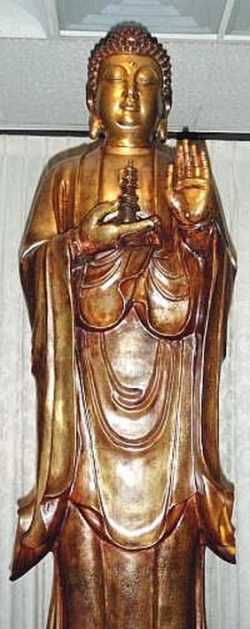Medicine Master Buddha
Click here to see other articles relating to word Medicine Master Buddha
Sanskrit: Bhaiṣajyaguru भैषज्यगुरु
Tibetan: Sanggye Menla སངས་རྒྱས་སྨན་བླ།
Chinese: Yàoshīfó 药师佛
Vietnamese: Phật Dược Sư
Japanese: Yakushi 薬師
Formally known as “Bhaiṣajyaguruvaiḍūryaprabhārāja,” Medicine Master and King of Lapis Lazuli Light, he is the Buddha of healing and medicine in Mahayana Buddhism. He is most commonly referred to as “Medicine Buddha” because he cures suffering using the medicine of his teachings.
Medicine Buddha is described in the Bhaiṣajyaguruvaiḍūryaprabhārāja Sūtra a Bodhisattva who made 12 great vows. Once he achieved Buddhahood, he became the Buddha of the eastern pure land of Vaiḍūryanirbhāsa, or Pure Lapis Lazuli. Bhaiṣajyaguru is typically depicted seated, wearing the three robes of a Buddhist monk, holding a lapis-colored jar of medicine nectar in his left hand and the right hand resting on his right knee, holding the stem of the Aruna fruit or Myrobalan between thumb and forefinger. In the sutra, he is also described by his aura of lapis lazuli-colored light. Bhaiṣajyaguru is described in the eponymous Bhaiṣajyaguruvaiḍūryaprabhārāja Sūtra (भैषज्यगुरुवैडूर्यप्रभाराज सूत्र), commonly called the Medicine Buddha Sutra, as a bodhisattva who made 12 great vows. On achieving Buddhahood, he became the Buddha of the eastern pure land of Vaiḍūryanirbhāsa (वैडूर्यनिर्भास), or "Pure Lapis Lazuli". There, he is attended to by two bodhisattvas symbolizing the light of the sun and the light of the moon respectively:
Suryaprabha (Chinese: 日光遍照菩薩; pinyin: rìguāng biànzhào púsà)
Candraprabha (Chinese: 月光遍照菩薩; pinyin: yuèguāng biànzhào púsà)
A Sanskrit manuscript of the Bhaiṣajyaguruvaiḍūryaprabhārāja Sūtra was among the textual finds at Gilgit, Pakistan, attesting to the popularity of Bhaiṣajyaguru in the ancient northwest Indian kingdom of Gandhāra. The manuscripts in this find are dated before the 7th century, and are written in the upright Gupta script
The Twelve Great Vows
The Twelve Vows of the Medicine Buddha upon attaining Enlightenment, according to the Medicine Buddha Sutra are:
To illuminate countless realms with his radiance, enabling anyone to become a Buddha just like him.
To awaken the minds of sentient beings through his light of lapis lazuli.
To provide the sentient beings with whatever material needs they require.
To correct heretical views and inspire beings toward the path of the Bodhisattva.
To help beings follow the Moral Precepts, even if they failed before.
To heal beings born with deformities, illness or other physical sufferings.
To help relieve the destitute and the sick.
To help women who wish to be reborn as men achieve their desired rebirth.
To help heal mental afflictions and delusions.
To help the oppressed be free from suffering.
To relieve those who suffer from terrible hunger and thirst.
To help clothe those who are destitute and suffering from cold and mosquitoes.
Dharani and Mantra
In the Bhaiṣajyaguruvaiḍūryaprabhārāja Sūtra, the Medicine Buddha is described as having entered into a state of samadhi called “Eliminating All the Suffering and Afflictions of Sentient Beings.” From this samadhi state he spoke the Medicine Buddha Dharani.
namo bhagavate bhaiṣajyaguru
vaiḍūryaprabharājāya tathāgatāya
arhate samyaksambuddhāya tadyathā:
oṃ bhaiṣajye bhaiṣajye mahābhaiṣajya-samudgate svāhā.
The last line of the dharani is used as Bhaisajyaguru’s short form mantra.
Praise to Medicine Master Buddha:
Medicine Master Thus Come One Lapis Lazuli Light,
With his splendor blazing net, how matchlessly adorned!
Limitless practice, boundless vows, benefit all living beings.
He accords with each one's wish and never will retreat.
Namo Medicine Master Lapis Lazuli Light Thus Come One of the Eastern Pure Lapis Lazuli Land.
Namo quelling disasters lengthening life Medicine Master Buddha.
The Venerable Master Hsuan Hua explains:
Medicine Master Vaidurya Light Tathagata is the Buddha of the Land of Vaidurya Light in the East. This Buddha bestows blessings and long life on people and helps them in times of disaster and difficulty.
